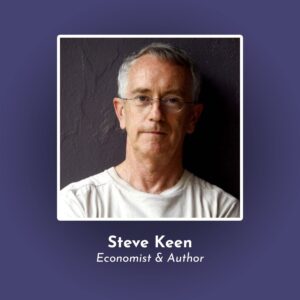
Show Summary
On this episode, economist Steve Keen offers a deep forensic history of why modern economic theory has neglected the role of energy in productivity – and why this “Energy Blindness” is now a major blindspot in how our culture views the present – and the future. The massive, temporary carbon surplus we’ve extracted over the last few centuries has resulted in an exponential increase in the standard of living for many. This explosion of global economic growth also happened to coincide with the development of all modern economic theories and formulas, leading to a core misunderstanding in the way our economies are powered. How have technology and innovation been used to cover up the role of a growing energy supply in the last century of rising prosperity? In the midst of discussions between value and labor, where does energy really fit into the equation? Where do we go once we understand the true role of energy in our economy – and will we have the ability to reshape economic policies to be in line with our energy realities?
About Steve Keen
Steve Keen is an economist, author of Debunking Economics and The New Economics: A Manifesto. His new book, Rebuilding Economics from the Top Down, will be released in 2024. He is a Research Fellow at the Institute for Strategy, Resilience, and Security at University College in London. Steve was one of the handful of economists to realize that a serious economic crisis was imminent, and to publicly warn of it from as early as December 2005. This, and his pioneering work on modeling debt-deflation, resulted in him winning the Revere Award from the Real World Economics Review.
In French, we have a motto that says that a simple drawing is often better than a long explanation. Jean-Marc Jancovici Carbone 4 President
That’s very understandable because with left atmosphere thinking, one of the problems is that you see everything as a series of problems that must have solutions. Iain McGilchrist Neuroscientist and Philosopher
We can’t have hundreds and hundreds of real relationships that are healthy because that requires time and effort and full attention and awareness of being in real relationship and conversation with the other human. Nate Hagens Director of ISEOF
This is the crux of the whole problem. Individual parts of nature are more valuable than the biocomplexity of nature. Thomas Crowther Founder Restor
Show Notes & Links to Learn More
Download transcript00:00 – Steve Keen works + info
03:42 – Classical Economics
03:51 – Adam Smith
04:01 – Physiocrats
04:35 – François Quesnay
06:49 – William Petty
08:35 – Richard Cantillon
12:09 – The Wealth of Nations
14:33 – History of the word energy
15:08 – David Ricardo
15:47 – Karl Marx
16:49 – Dark satanic mills, working conditions in industrialism
19:05 – Antoine-Augustin Cournot, Cournot oligopoly theory
19:23 – Jean-Baptiste Say
20:19 – Subjective Theory of Value
21:20 – Henry Rosovsky
23:04 – Capital Vol. 1
25:15 – Neoclassical economics
27:44 – Marshall, Walras and Jevons
28:05 – Cobb-Douglas Production Function
26:35 – Marginal productivity of labor, marginal productivity of machinery, J.B Clarke, marginal productivity of income distribution
30:38 – Bureau of Economic Analysis
32:11 – Homogeneous production function
36:52 – Computer general equilibrium models
37:10 – New Classical Economists
37:19 – Keynesian economics
37:37 – Aggregate Production Function
37:52 – Solow, Solow Residual
49:49 – Lucas Critique
51:01 – Robert Ayres, Reiner Kümmel
51:47 – Leontief Production Function
56:44 – Rüdiger Bachmann, What if? The Economic Effects for Germany of a Stop of Energy Imports from Russia
58:31 – Wassily Leontief
59:33 – Post-Keynesian
1:00:27 – Constant elasticity of substitution
1:09:35 – BTUs in a barrel of oil
1:15:51 – Howard T. Odum, Charles Hall, Nicholas Georgescu-Roegen
1:17:59 – Anne-Robert-Jacques Turgot
1:22:51 – Climate Change
1:22:59 – William Nordhaus and work on climate (1991)
1:23:56 – James Hansen, Warming in the Pipeline
1:24:21 – El Nino, La Nina
1:26:36 – Wet Bulb Temperature







